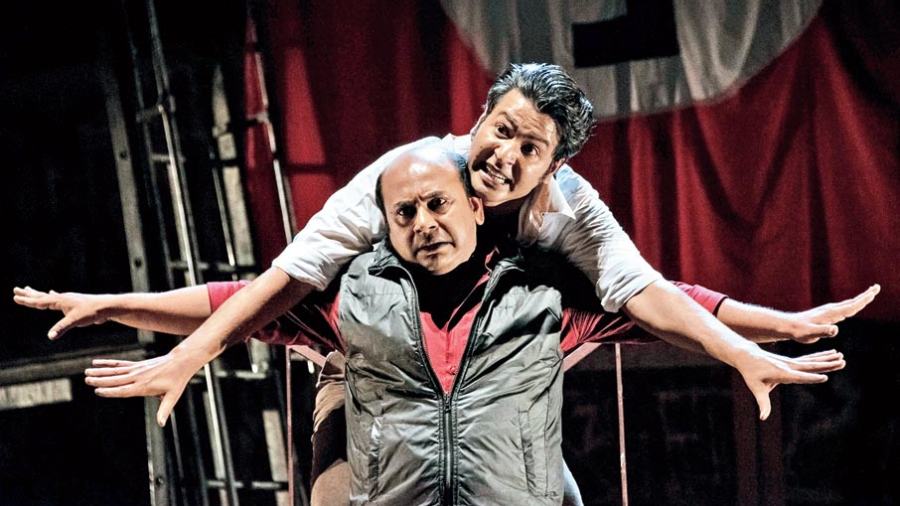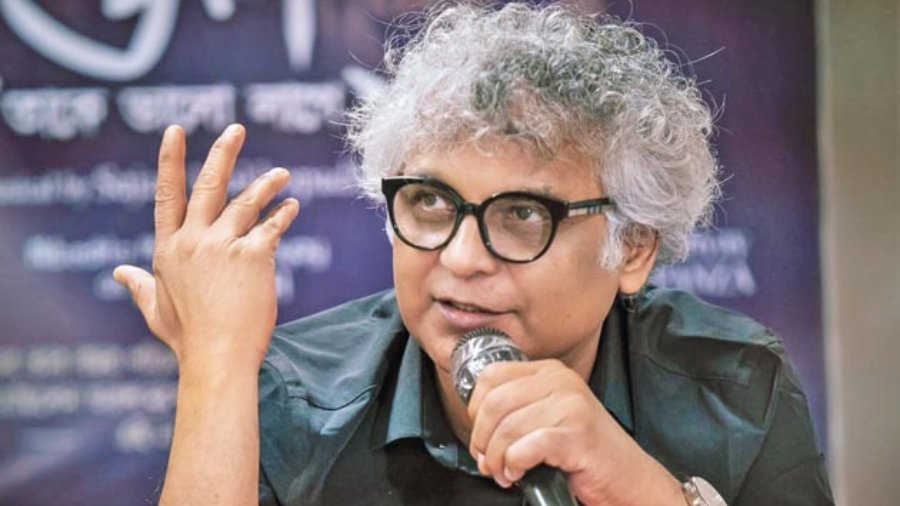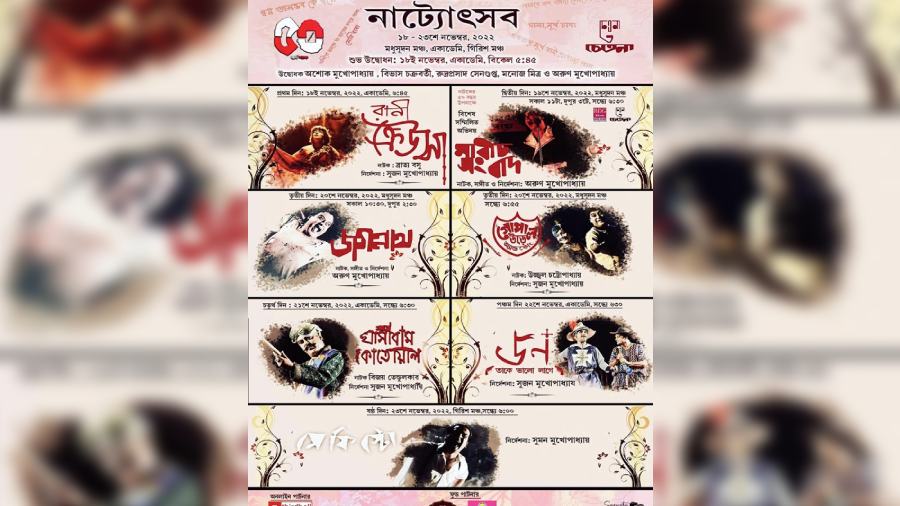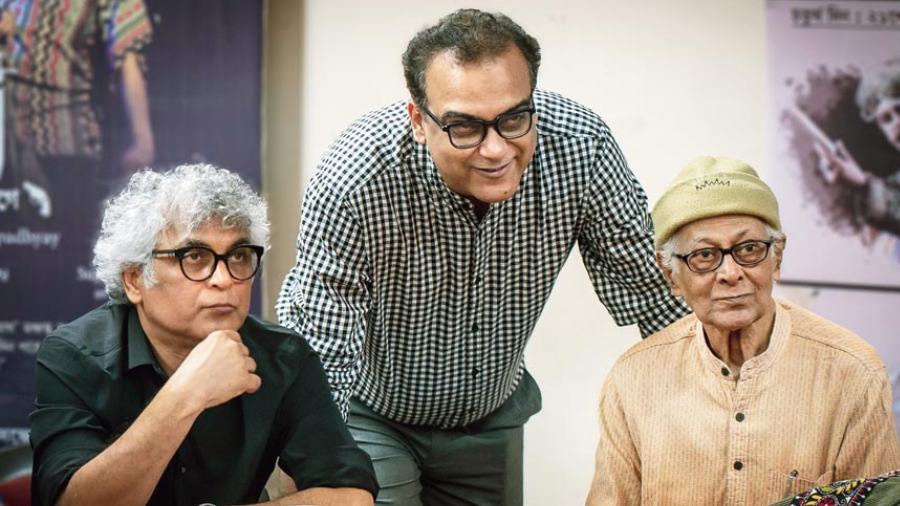City-based theatre group Chetana, which turns 50 this month, is organising a six-day theatre festival from November 18 to 23 to celebrate the occasion. To be inaugurated by doyens of the theatre fraternity like Rudraprasad Sengupta, Bibhas Chakraborty, Ashok Mukhopadhyay, Manoj Mitra and its founder Arun Mukhopadhyay, the festival will feature the re-staging of its first and most critically acclaimed production, Mareech Sangbad. Several other popular productions from its vast repertoire including Jagannath, Mephisto, Ghasiram Kotwal and Don, Take Bhalo Lage as well as new plays like Rani Creusa and Gopal Ure & Co. will be staged.
Actively involved with Chetana since the early 1990s, Arun Mukhopadhyay’s son Suman Mukhopadhyay has taken the group to newer heights with his seminal works on the stage in the city and beyond. Here, the veteran theatre personality shares with The Telegraph his experiences with Chetana, its journey and its way forward, in the light of the golden anniversary of the group. Excerpts.
What are some of the significant milestones in Chetana’s journey?
As you already know, Chetana’s first production, Arun Mukhopadhyay’s Mareech Sangbad, is a milestone in Indian theatre. A ground-breaking work, it was very well received all over the country and enjoys patronage to this day. Another major landmark is Jagannath (1977), also by Arun Mukhopadhyay, that had a great impact. Then came Putul Nacher Itikatha in the first decade of this century. In between, Teesta Parer Brittanto and Mephisto, during mid-1990s to the turn of the century, were very successful. You can say they are part of the second wave of Chetana’s productions as both were directed by me. Then came productions like Ghasiram Kotwal, directed by my younger brother, Sujan Mukhopadhyay, which became a huge success. Then, after a hiatus of many years, I came back to perform on stage, this time under the direction of my brother. These have been some of the significant moments in Chetana’s 50-year history, comprising 40 full-length plays and 12 short plays.
Any philosophy or reasons that led to the birth of Chetana?
As a state goverment employee in the 1960s, Arun Mukhopadhyay was associated with the cultural wing of the Left-run state coordination committee and had directed and staged many plays for it. He won great acclaim for these productions. In the early 1970s, with the help of several like-minded individuals, he decided to come out of the cover of a political umbrella and start his own theatre journey. So Chetana was in a way also born out of an impulse to carve an independent theatre identity without the influence of any political agenda.

A moment from the new production of Chetana’s Mephisto
What kind of challenges has Chetana faced over the years and how did you deal with them?
One of the main challenges faced by Chetana has been to come up with new productions consistently without any compromise on the artistic quality of the work. Chetana productions have always been considered the benchmark in terms of theatrical excellence. Still, we have faced failures. Some plays did not receive the response they deserved. This was partly due to the changing times. Television as an entertainment medium became popular. The 1990s saw the advent of a new cultural mode of production. These challenges were faced by all theatre groups.The challenge specifically faced by Chetana was that we were considered to be a voice against the political authority. Nevertheless plays like Jagannath, which portrayed the failure of the rulers to understand the sufferings of the oppressed or more recently Teesta Parer Brittanto, which was a critique of the land reforms movement, remained firm in their ideal of raising their voice against any form of injustice. So, in spite of problems, Chetana has remained rock-steady in its uncompromising political thought and criticism of society and maintained its commitment to the people and to the times.
Chetana was formed in the heydeys of group theatre 50 years ago. What kind of relevance do you think ‘group theatre’ has in the present day?
If you look at the history of Chetana right from my father Arun Mukhopadhyay’s time to the present, we have always produced plays that are topical and politically challenging. So the relevance of theatre is always there. However, the concept of group theatre as a whole has undergone sea changes, in terms of its structure and ideology. It has now become more flexible, less rigid and has done away with earlier regimentation that did not allow members of one group to work with any other, or even to work in films and television. Mephisto combines the talents of three different groups. Collaborative works encourage free thinking, exchange of ideas and has given way to a new face in group theatre. In fact, the term ‘group theatre’ does not apply any more now. Instead we can now speak about theatre groups formed with ‘non-professional’ actors, directors and technicians, who have the freedom and flexibility to associate with other groups or to work in television, web series or cinema, because honestly speaking, it has never been possible to earn one’s living by only doing theatre.

Suman Mukhopadhyay
Tell us about your own favourite Chetana productions.
Definitely Mareech Sangbad and Jagannath are my favourites. My exposure to international theatre and contemporary performances worldwide makes me say without a shadow of doubt that these two are international-class productions. Apart from these, Dukhi Mukhi Joddha, later adapted as Don, Take Bhalo Lage are outstanding performances. Roshan is another favourite, although it did not get much public attention. And of course, Putul Nacher Itikatha, which is an exceptional work. To me, all of them are excellent examples of good theatre and provide a complete theatre experience.
How did your association with Chetana help you evolve as a director?
Since childhood, Chetana is subliminally in my blood. As a kid, I have spent hours watching rehearsals and performances, often eating my dinner and even falling asleep in the green room. My experiences travelling with the group while Chetana performed for rural and urban audiences across Bengal and beyond, shaped my early ideas about life and people. Though on a subconscious level, I received hands-on training on many aspects of theatre through these experiences. After returning from my theatre studies abroad, my learning and exposure to Western theatre performances including dance theatre and opera helped me integrate their methodology to our socio-political context. In 2000, after the success of Teesta Parer Brittanto, I was told that the production looks completely different because of my own distinctive style. However, I personally believe I am highly influenced by my father’s technique, although I have assisted stalwarts like Utpal Dutt and Bibhas Chakraborty as well.

The poster for Chetana’s 50th anniversary theatre festival
What is it about Chetana’s latest productions that excites you?
Chetana’s production Memphisto is actually a re-mounting and re-designing of an older production with a new cast. Originally staged post the Gujarat riots, it is a topical play that speaks against fundamentalism and religious forces and was quickly mounted again before the last election. It is directed by Sujan Mukhopadhyay, who is holding the reins of Chetana right now. What is important is that he is doing some really innovative work. From Ghasiram Kotwal to Don, and to the most recent Gopal Ure & Co., you will find that he has gradually developed his own authentic style, though he has also been coached by my father. So chronologically speaking, our latest production is Gopal Ure & Co., which is in a play-within-a-play format and is a satire on the current socio-political scenario.
What can Chetana offer new-generation audiences?
New-generation audiences have absolutely no idea of the time when landmark plays like Mareech Sangbad and Jagannath were staged. Millennials have perhaps never heard of or seen Teesta Parer Brittanto. I think they are deprived of the flavour of a major cultural experience, and the way it can empower them and encourage them to think differently. What is significant is that these performances have stood the test of time and remain valid even today. They offer an experience worth watching and learning from. The upcoming theatre festival (on the occasion of Chetana’s 50th anniversary) provides them an opportunity to watch these re-mounted classics and gain knowledge about a golden time in Bengal’s cultural journey over the last half a century and also a chance to see for themselves the great creative work achieved on the Bengali stage.
